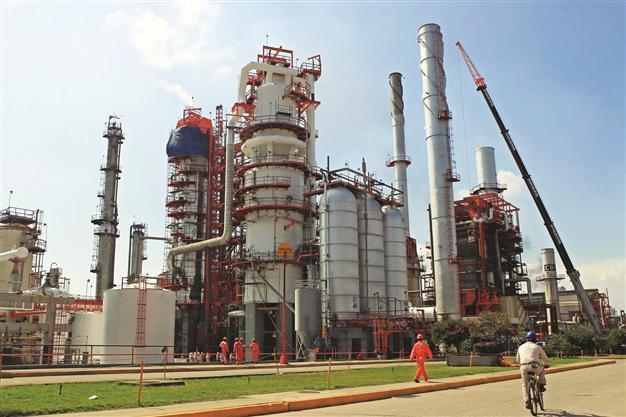Energetic approach of Albania economy

Refinery workers walk at one of the facility’s catalytic heavy hydrocarbon crude oil plants. REUTERS photo
We can see the future development of the sector of energy in Albania through some very important steps: Structural reform on energy, affecting the whole sector, and specifically in each branch – electric energy, hydrocarbons, renewables and bio energy. This will be accompanied with efficiency on energy in order to insure and guarantee sustainability in the system. We have started and we are continuing with the legal framework in the sector:1. Strategy for energy sector - to be approved in April 2014
2. Strategy for the hydrocarbon sector - first semester 2014
3. Laws to be passed or amended:
- On the Sector of Electric Energy – in the first semester of 2014 – in line with the EU Directive, the third package on the electric sector
- Model of the market for electric energy (still to be amended) – at the end of 2014
- On the research and development of hydrocarbons – in the first semester 2014
- On processing, transporting and trading oil, gas and their sub products
- Law on gas sector – in the first semester 2014
- Law on technical standards on the use of equipment – electricity, pressure and hydrocarbon equipment – in February 2014
- Law on renewable energy (still to be amended) – in the first semester 2014
And still to come
- The rule on hydrocarbon sector – in March 2014
- Law on the efficiency of energy – in fall 2014

Ilir Bejtja, Deputy Minister of
Energy and Industry of Albania
The next step regards the design of a sector in harmony with regional and EU goals on the development of the sector. We will be part of the regional and European community of energy and we are developing projects and fostering policies with such a focus. Being part of the Union of the Mediterranean on the development of energy increases our chances and policies in developing the sector, using best practices and, at the same time, gathering benefits from possible regional and larger cooperation.
The participation in the TAP and IAP gas projects, the gasification of Albania and the creation of a master plan in this regard, as well as on projects relating to renewable energies, such as the Solar Program for the Mediterranean, which was recently proposed at the Brussels’ Ministerial for Energy with the participation of the UFM in December 2013, or being part of the regional network for the transmission of energy, as well as considering the great importance of bilateral agreements we have with regional countries like Greece, Kosovo, Macedonia, Montenegro and Italy, will increase our power in energy and offer more support to our economic development, our social and political presence and our contributions to the region as well.
Considering the climactic conditions of our country, the next very important program on electric energy will be the use of solar and wind energy to generate electrical energy. These programs are in total accordance with the environment and guarantee sustainability for the entire national energy system.
The new Renewable Energy Law (REL) aimed at transposing Directive 2009/28/EC with regard to sustainability criteria and the certification system, as well as introducing adequate incentive measures, will permit the Albanian market to make use of this energy too.
Proper feed-in tariffs for all renewable energy sources are still to be developed by ERE and submitted for approval to the government to ensure that Albania is on track to reach the interim trajectory. The transmission system operator and distribution system operator have to improve compliance and transparency relating to the setting and publishing of the standard rules on costs of connection to the grid or grid reinforcements, which are necessary to integrate new renewable energy producers.
As for the energy efficiency, our commitment has been slow. No progress was achieved during 2012/2013. A new and overdue Energy Efficiency Law has existed in draft form since 2011. The draft was developed in cooperation with the Secretariat. It has still not been adopted. Considering the above analysis of the energy situation in Albania, and the high impact this public good has in the general development of the country, as well as the trust it creates among stakeholders in the economy and in the public by increasing social capital at macro-level, the steps confirm our intention to commit to all our goals and objectives in the sector. Increasing performance in energy ensures steady economic growth, as well as sustainable development in the country. The impact in employment rate and in the business factor of these regulations and actions is the increase of the national economy’s competitiveness in the region and beyond.
At this point, our state of compliance is as follow: We need to move faster with the structural reform on energy, legal improvements and investments in the sector, all in line with EU directives on this regard, in order to create sustainability in energy use and in the energy sector itself.
This is the speech by Ilır Bejtja at the Eurasia Economic Summit in Istanbul.
















